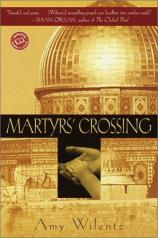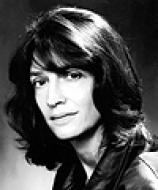Reading Group Guide
Discussion Questions
Martyrs' Crossing

1. Who are the martyrs of the title? How does the author use the idea of martyrdom--dying for a cause--throughout the interwoven stories of her characters? What is the author's attitude toward such martyrdom?
2. Who are the heroes of Martyrs' Crossing? Discuss how Yizhar, Ahmed, Shuekhi, Zvili, Doron, George Raad and Hassan, too, each act according to (or in spite of) personal codes of honor, morality, and patriotism. In a conversation between Yizhar and Doron, Yizhar says, "I despise heroes . . . Heroes act, and other people suffer." Which character comes closest to the author's idea of a hero? What constitutes a hero for our time?
3. As Marina is crossing the checkpoint with masses of Palestinians, she thinks They were her own people, standing packed around her. Finally, she was sharing their predicament. She had always thought she wanted to. Is Marina a certain kind of American naif? Or is she politically committed in a way her father is not? Is her marriage to Hassan the result of naivete? In what ways has her American upbringing left her unprepared to return to her people? Do Americans romanticize the struggles of disenfranchised people? Do Americans romanticize the Israeli-Palestinian conflict? Why do you think the author chose to give Marina an American past?
4. Underlying the stories in Martyrs' Crossing are the twin questions of what constitutes home, and, what is the meaning of home? George thinks of his friend Ahmed, (Chapter 10 p. 113) "It had been decades since they leaned against each other in this familiar way, not considering politics and the oceans that divided them. Possibly, George thought, this is the meaning of home." Hassan (p. 153) has been teaching Marina about her homeland, saying "You call yourself a Palestinian?" How is the idea of home different for the various characters in this story? What is your idea of home?
5. In this story, people who are ostensibly on the same side do not appear to trust each other. Allies are enemies and foes might be friends. Doron and Marina, for example, seem to understand that in other circumstances they might have more in common than not. George and Ahmed are described as friends in the early part of the book, and by the end, George is described as Ahmed's "greatest enemy," because of differences in what they believe. Doron thinks: I am the enemy, I am the enemy, and he asks Yizhar, "So are we enemies now?" (p. 195) Which characters seem to you to be worthy of the term "enemy"? Which characters seem truly at cross purposes? Which are truly dangerous, and to whom? Who is worthy of trust, and for whom?
6. What are the different ways in which the death of Ibrahim becomes fodder for both the Palestinian and Israeli political machines? Discuss the uses of human tragedy for political purpose. Is this inevitable? Justifiable? How does this kind of propagandizing escalate or ease tension?
7. Discuss George's relationship with Ahmed. Throughout the book, George dwells on his childhood friendship with Ahmed. After Ibrahim's death, George thinks, "If Ahmed was insincere under these circumstances, then Palestine was lost to George." (p. 56) How does their friendship evolve over the course of the book? Do the two men have the same goal? The same beliefs?
8. Examine Yizhar's brand of loyalty to Israel. He spins the death of Ibrahim in the press, (p. 72) and Wilentz writes, "Yizhar felt no remorse. His version of the story was not a lie." Is Yizhar lying? Should he feel remorse? In Yizhar's job, where is the line between good and evil? Discuss the differences between Yizhar and Doron.
9. Is there a particular politics or ideology underlying the story in Martyrs' Crossing? Is the book more sympathetic to one side or the other?
10. "Our little Ibrahim was not a brave Palestinian freedom fighter," George says at his grandson's funeral. (p. 178) "If you want to place blame for my grandson's death, look in the mirror as well. Look at yourself and the Authority." Because of that speech, the lawyer Sheukhi believes George Raad to be a traitor. Sheukhi has one rule, (on p. 185) "Never criticize a fellow Palestinian in public." Yizhar, too, seems to have a similar rule about his fellow Israelis. What are the uses of loyalty in a political conflict? Is this unwillingness to criticize one's own a good impulse, or a bad one? What other examples--say, in police departments--of this unwillingness to criticize one's own can you think of? Discuss the characters' choices in terms of moral absolutism and moral relativism. Is George a traitor to his people? Is Doron a traitor to his?
11. Sheukhi makes a choice. Doron makes a different kind of choice. Both men feel a need to act. Contrast their choices.
12. James Baldwin wrote, "We are trapped in history, and history is trapped in us." How are the characters in Martyrs' Crossing trapped in history? How is it trapped in them? Do you believe human beings can escape the trap of history? If so, how? Who in this story comes closest to escaping? What historical traps have a grip on Americans?
Martyrs' Crossing
- Publication Date: January 2, 2002
- Genres: Fiction
- Paperback: 336 pages
- Publisher: Ballantine Books
- ISBN-10: 0345449835
- ISBN-13: 9780345449832







